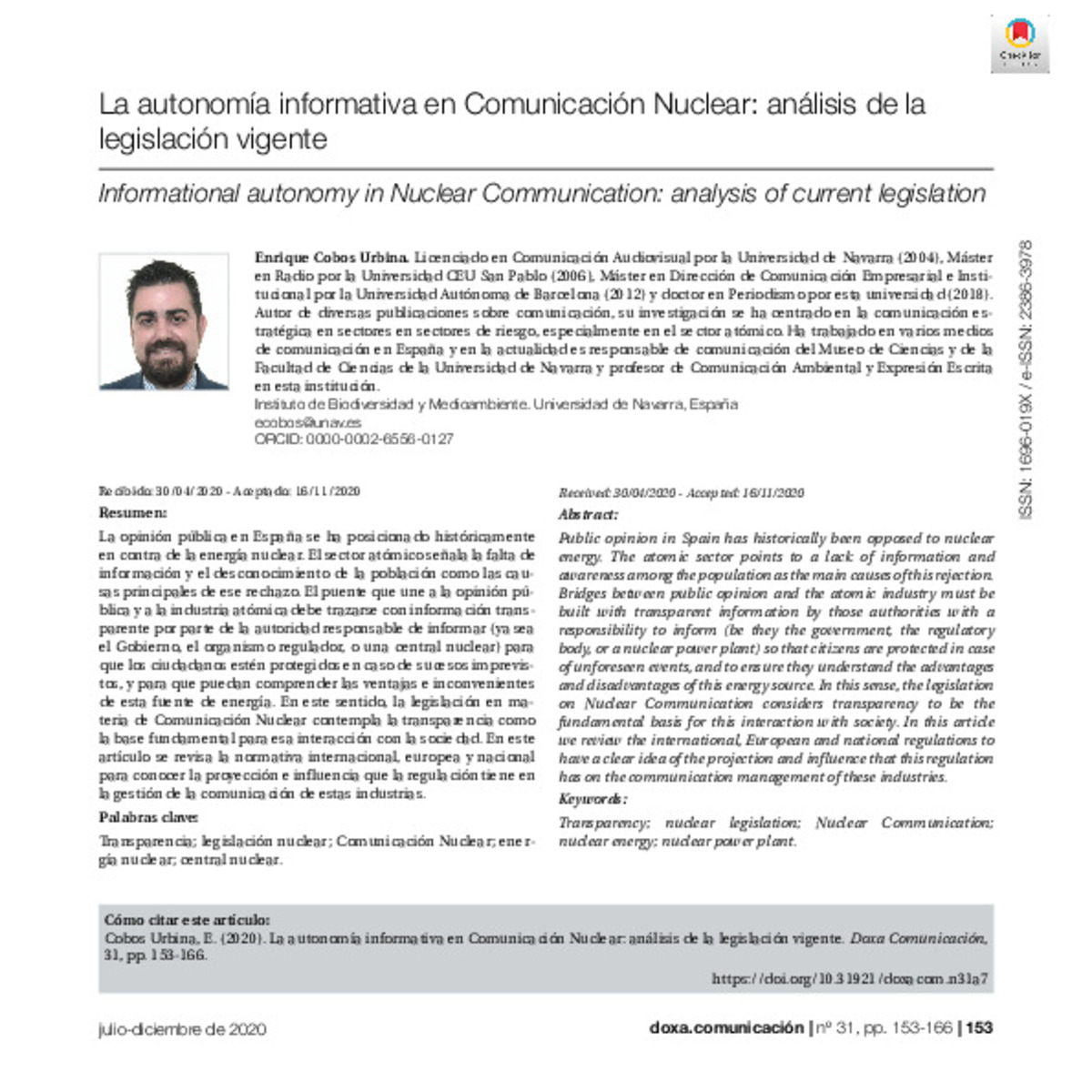Full metadata record
| DC Field | Value | Language |
|---|---|---|
| dc.creator | Cobos-Urbina, E. (Enrique) | - |
| dc.date.accessioned | 2023-06-01T11:36:22Z | - |
| dc.date.available | 2023-06-01T11:36:22Z | - |
| dc.date.issued | 2020 | - |
| dc.identifier.citation | Cobos-Urbina, E. (Enrique). "La autonomía informativa en Comunicación Nuclear: análisis de la legislación vigente". Doxa Comunicación. 31, 2020, 153 - 166 | es |
| dc.identifier.issn | 1696-019X | - |
| dc.identifier.uri | https://hdl.handle.net/10171/66536 | - |
| dc.description.abstract | La opinión pública en España se ha posicionado históricamente en contra de la energía nuclear. El sector atómico señala la falta de información y el desconocimiento de la población como las causas principales de ese rechazo. El puente que une a la opinión pública y a la industria atómica debe trazarse con información transparente por parte de la autoridad responsable de informar (ya sea el Gobierno, el organismo regulador, o una central nuclear) para que los ciudadanos estén protegidos en caso de sucesos imprevistos, y para que puedan comprender las ventajas e inconvenientes de esta fuente de energía. En este sentido, la legislación en materia de Comunicación Nuclear contempla la transparencia como la base fundamental para esa interacción con la sociedad. En este artículo se revisa la normativa internacional, europea y nacional para conocer la proyección e influencia que la regulación tiene en la gestión de la comunicación de estas industrias. | es_ES |
| dc.description.abstract | Public opinion in Spain has historically been opposed to nuclear energy. The atomic sector points to a lack of information and awareness among the population as the main causes of this rejection. Bridges between public opinion and the atomic industry must be built with transparent information by those authorities with a responsibility to inform (be they the government, the regulatory body, or a nuclear power plant) so that citizens are protected in case of unforeseen events, and to ensure they understand the advantages and disadvantages of this energy source. In this sense, the legislation on Nuclear Communication considers transparency to be the fundamental basis for this interaction with society. In this article we review the international, European and national regulations to have a clear idea of the projection and influence that this regulation has on the communication management of these industries. | es_ES |
| dc.language.iso | spa | es_ES |
| dc.rights | info:eu-repo/semantics/openAccess | es_ES |
| dc.subject | Transparencia | es_ES |
| dc.subject | Legislación nuclear | es_ES |
| dc.subject | Comunicación Nuclear | es_ES |
| dc.subject | Energía nuclear | es_ES |
| dc.subject | Central nuclear | es_ES |
| dc.subject | Transparency | es_ES |
| dc.subject | Nuclear legislation | es_ES |
| dc.subject | Nuclear Communication | es_ES |
| dc.subject | Nuclear energy | es_ES |
| dc.subject | Nuclear power plant | es_ES |
| dc.title | La autonomía informativa en Comunicación Nuclear: análisis de la legislación vigente | es_ES |
| dc.title.alternative | Informational autonomy in Nuclear Communication: analysis of current legislation | es_ES |
| dc.type | info:eu-repo/semantics/article | es_ES |
| dc.publisher.place | Madrid | es_ES |
| dc.description.note | Esta obra está bajo una licencia internacional Creative Commons Atribución-NoComercial 4.0. | es_ES |
| dc.identifier.doi | 10.31921/doxacom.n31a7 | - |
| dadun.citation.endingPage | 166 | es_ES |
| dadun.citation.publicationName | Doxa Comunicación | es_ES |
| dadun.citation.startingPage | 153 | es_ES |
| dadun.citation.volume | 31 | es_ES |
Files in This Item:
Statistics and impact
Items in Dadun are protected by copyright, with all rights reserved, unless otherwise indicated.






